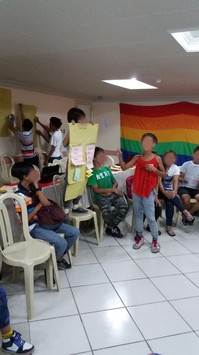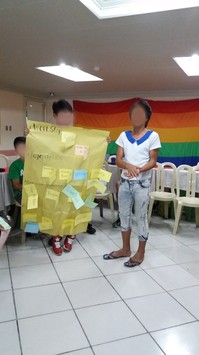- TOP
- 国際人権基準の動向
- FOCUS
- September 2018 - Volume 93
- Addressing the Situation of LGBT Children
FOCUS September 2018 Volume 93
Addressing the Situation of LGBT Children
Filipino children spoke about their experiences, views and rights as lesbian, gay, bisexual and transgender (LGBT) children in a workshop held in 2016. Their discussions in the workshop reveal significant aspects on the issues facing LGBT children.
 |
 |
Domestic Tension and Silence1
LGBT children are often forced into stressful situations caused likely by a complicated mix of emotional abuse (such as verbal harassment and neglect) and outright violence (such as battery and sexual assault), often perpetrated by parents, siblings, or other relatives.
The children suffer in silence under these situations. They do not talk about the problems in places they frequently go to (such as school) because LGBT issues are not openly discussed there. They also do not seek help from relevant authorities (such as the local police) because they are not sure whether or not their problems will be taken seriously or can be properly addressed.
Consequently, they also refuse to do anything on the problem. In the view of one child, the situation has always been this way and thus the only thing to do is to persevere until the children are able to live independently. Another child sees the danger of doing something about the situation as it would expose them to greater harm such as when the erring family member seeks retribution. And still another child finds love for the family as too strong to allow it (family) to be embarrassed or put in harm’s way. This view is shared by other children. In all three cases, the children cope through other means because the broader culture of silence makes redress impractical or even impossible. Met with silence from others, they turn silent themselves.
There is also the equally difficult issue of dealing with experiences that do not fall under the typical definition of “abuse.” A child whose parents accuse each another of bad parenting as the reason for her (child) being transgender developed feelings of shame, and blamed her “not being normal” as the cause of her parents’ conflict. The lack of outright abuse, although a good thing, makes intervention by outside parties difficult to justify.
Rejection and Its Varieties
The experience of rejection by loved ones among LGBT children is insidious, not only because it is a powerful and disruptive experience that has adverse health impact, but because it happens so often. Those who respond to this situation have to calculate their action carefully. The most obvious form of rejection is that of family members who literally reject a LGBT child with statements such as “wala akong lesbianang anak” (“I have no lesbian child”), as one of the workshop participants reported. But it can also take subtler forms. One participant was told by her parents that “Wala naman sa lahi natin ang lesbiana” (“Being lesbian isn’t in our genes”), which though not directly addressed to her made her think that she was not a “legitimate” member of the family.
Another participant pointed to a related incident of his brother telling him “walang lugar sa mundo ang mga bakla” (“there is no place in the world for gay people”). Again, the statement was not directly addressed to him but it nonetheless constituted an assault on his sense of place in the world. Another child recounted an experience regarding her grandfather who disapproved of her being a lesbian and uttered his wish before dying: “Sabi ng lolo sana bago siya mamatay, maging maayos ako” (“Grandfather said that he hoped that I would fix myself before he died.”). It is easy to imagine how this statement could have deeply distressed a child brought up in a culture where family is held in high regard.
Abuse in the Community
The joint submission of civil society organizations on the situation of lesbian, gay, bisexual, transgender, intersex and queer (LGBTQ) for the third cycle (2017) of Universal Periodic Review (UPR) of the Philippines explains the discussion of the children in the 2016 workshop regarding the situation at the community level:2
A group of self-identified children aged 13 to 17 years old shared during a consultation workshop various incidents of violence faced at the community level. Many reported instances of verbal abuse where they were told the following slurs: “ipako sa krus” (crucify to death), “salot sa lipunan” (disgrace to society); “wala ang bakla sa bible … anak kayo ng demonyo” (gay people cannot be found in the bible…you are devil’s children). A child reported an incident of extortion. He narrated, “When I was in Grade 7, I was bullied. I was on my way to home from school and someone put an arm over my shoulder and asked for a peso. It did not end there. The next day, a kid pushed me and asked money from me and I said I didn’t have any money! He threatened me with a sharp object [to force me to] give him money. I was relieved [that] there were a lot of people who saw us and he couldn’t hurt me in front of them. I told my parents about it but I haven’t forgotten about it.”
Community Redress Mechanisms
Based on the experiences of the workshop participants, the response of local government to their situation often compounded rather than alleviated their problems. Even in Quezon City, the only city so far with anti-discrimination ordinance whose implementing rules and regulations were adopted with civil society involvement, action on LGBT children’s issues has not been straightforward. One child who reported her abusive uncle to barangay (community) officials was not taken seriously and was told that she was just exaggerating the situation. And while there are responsive local governments, LGBT children are unable to seek redress from them because they either do not know where to go or traveling to these places – located mostly in Metro Manila – is costly.
Major Issues
The participants in a national consultation held by Civil Society Coalition on the Convention on the Rights of the Child (CSC-CRC) with the education sector, civil society organizations, and children in August 2016 agreed that [Sexual Orientation and Gender Identity and Expression] “SOGIE-based bullying is the mixed result of various factors, which include the absence of open discussion on SOGIE or being LGBT at home and in the school, and lack of or poor support systems from parents, teachers, and friends – all of which have huge impacts on LGBT students.” The consultation also revealed that the child protection policy of the Department of Education comprehensively covered the government policies on bullying, included child protection in the comprehensive monitoring of schools (including gathering of data on bullying), and started finding ways of including SOGIE in the curriculum and tapping gender and development experts to support initiatives at the regional and division levels of the Department.3
Some Concerns
While the rights of LGBT children are getting more attention, there are issues regarding relations between child rights and LGBT rights. There is a perception that the United Nations Convention on the Rights of the Child is not applicable in advancing the rights of LGBT persons. This view is attributed to the lack of engagement of many child rights organizations in addressing LGBT issues. Some activists view child rights advocacy as based on conservative perspective, thus LGBT issues are deemed sensitive to handle. This conservative perspective has to be clarified considering the General Comments issued by the United Nations Committee on the Rights of the Child (CRC) on the protection of the rights of LGBT and intersex children.
CRC General Comment No. 14, which focuses on the best interest of children, defies the notion of children as a homogenous group. It urges governments to recognize the diversity of children when determining their best interests. It states that the “identity of the child includes characteristics such as sex, sexual orientation, national origin, religion and beliefs, cultural identity, personality.” (Article 55)
Articles 34 of the CRC General Comment No. 20 on the implementation of the rights of the child during adolescence expressly condemns the imposition of the “so-called ‘treatments’ to try to change sexual orientation and forced surgeries or treatments on intersex adolescents.” It urges States to take measures to eliminate bullying, discrimination and violence against LGBT and intersex adolescents through the repeal of criminal laws, the conduct of public awareness-raising, the passage of laws to prohibit discrimination, and adoption of support measures to ensure the safety and security from harm of the children.
Furthermore, CRC General Comment No. 21 on the rights of children in street situations likewise clarifies that children do not belong to a homogenous grouping; children in street situations have diverse identities and contexts such as ethnicity, disability, sexual orientation and gender identity/expression. (Article 6) It clarifies that due to children’s diverse identities they face multiple and intersecting forms of discrimination. General Comment No. 21 also points out the importance of the state obligation towards non-discrimination: such obligation does not only entail prohibition of all forms of discrimination but also taking proactive measures to achieve substantive equality. (See section on National Strategies of General Comment No. 21)
Recommendations
The joint submission of civil society organizations for the third cycle (2017) of Universal Periodic Review (UPR) of the Philippines has several recommendations pertinent to LGBT children:
- Legislate a comprehensive anti-discrimination policy which protects all persons from all forms of discrimination on the basis of SOGIE in all settings;
- Ensure that community-based redress mechanisms, e.g., the Barangay (Community) Justice System and the Barangay Council for the Protection of Children, are competent to address cases of human rights violations and abuses against LGBT persons;
- Intensify public education and awareness on SOGIESC (Sexual Orientation, Gender Identity and Expression, and Sex Characteristics) especially among public servants such as by conducting trainings at least twice a year in each government agency/office; and
- Ensure that educational policies and school curriculums promote the human rights of LGBT persons such as by removing all SOGIESC-based discriminatory content in textbooks and learning materials, providing SOGIESC-inclusive counselling services for students, and providing access to gender-neutral toilets in all schools and educational facilities.
Further recommendations regarding education consist of the following:
- For the Department of Education - integrate discussion on the rights of LGBT children and other excluded groups of children, i.e., children of indigenous peoples (IPs) and children with disabilities, in the school curriculum;
- For the Department of Education and local government units - consider formulating plans to implement awareness-raising and educational programs to sensitize service providers, adults and children on LGBT rights;
- For the Council for the Welfare of Children - include programs aimed at preventing and addressing SOGIE-based bullying in the National Plan of Action for Children and National Plan of Action on Violence against Children.
ASEAN SOGIE Caucus (ASC) is a regional organization of LGBTIQ (lesbian, gay, bisexual, transgender, intersex and queer) human rights defenders, with members in eleven countries in the Southeast Asian subregion. ASC works to empower local groups and activists in doing innovative and diverse advocacy tactics to influence domestic, regional and United Nations human rights mechanisms. ASC applies an intersectional approach in its work by collaborating with fellow civil society actors in shaping an inclusive and transformative ASEAN region. It is a registered non-governmental organization in Manila.
For further information, please contact: ASEAN SOGIE Caucus, 8th Flr. Unit 8-R, Future Point Plaza 3, 111 Panay Avenue, South Triangle, Quezon City, Metro Manila, 1103, Philippines; ph (632) 285 7950; e-mail: rsilverio[a]aseansogiecaucus.org; https://aseansogiecaucus.org.
Endnotes
1 The texts here and in the next sections are edited excerpt of the report on the workshop Bata at Bahaghari – Experiences of LGBT Children in the Philippines, ASEAN SOGIE Caucus, 2017, Quezon City. The whole report is available at https://aseansogiecaucus.org/news/asc-news/95-bata-at-bahaghari.
2 ASEAN SOGIE Caucus, ibid.
3 Based on Joint CSC-CRC UPR Submission, 3rd Cycle – Philippines 27th Session (2017), full document available at https://www.upr-info.org/sites/default/files/document/philippines/session_27_-_may_2017/js6_upr27_phl_e_main.pdf.
